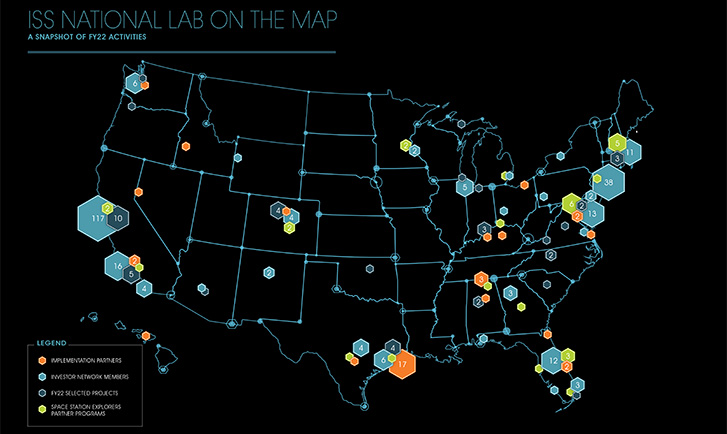The ISS National Lab continues to create demand that fosters supply-side growth of the LEO economy and supports the community of Implementation Partners (companies and organizations that offer services related to payload development). With the addition of LaMont Aerospace this year, there are 39 ISS National Lab Implementation Partners (see a full list in the Implementation Partner directory) that range from well-established aerospace companies to innovative startups. These Implementation Partners provide a wide variety of capabilities and services that allow researchers to translate their ground-based R&D to successful spaceflight projects.
“The ISS National Lab plays an integral role in the utilization of this incredible orbiting learning platform, and NASA strongly values this partnership to open access and opportunity to researchers and innovators. In the coming years, the ISS National Lab will continue to be an essential component by enabling space-based research that will bring value to humanity and build commerce in LEO as we begin the transition to commercial destinations in LEO.”
- Joel Montalbano, NASA ISS Program Manager
To facilitate business-to-business relationships for space-based R&D, the ISS National Lab continues to connect Implementation Partners with users via an online Implementation Partner Portal. In FY22, 82 percent of CASIS funding was used to cover Implementation Partner costs for researchers. The ISS National Lab also continues to collaborate with Implementation Partners through bi-annual Implementation Partner workshops that guide supply-side economic development in LEO.
There are currently 17 Commercial Service Providers (the subset of Implementation Partners that own and operate facilities on the ISS or are developing future facilities) and 24 ISS National Lab commercial facilities (full list in Appendix B). This year, the definition of an ISS National Lab commercial facility was broadened to include launch-on-demand facilities due to a significant increase in their utilization. Facility updates in FY22 included an upgraded version of Space Tango’s TangoLab facility and successful testing of Nanoracks’ Bishop Airlock to dispose of waste from the ISS, representing the first open-close cycle of the commercial airlock.
“The ISS National Lab has helped build demand for research and manufacturing in space and has served as an incubator for the development and testing of new technologies and enterprise models. The fact that there may be multiple private commercial space stations following the ISS speaks to the foresight of the legislation that created the ISS National Lab and the ability of CASIS to execute its mission.”
- Rich Boling, VP at Redwire Space
FY22 key Implementation Partner milestones include the following:
- Axiom Space achieved a historic first when the company launched four astronauts on Axiom Mission 1, the first all-private astronaut mission to the ISS.
- Intuitive Machines announced its plans to become a publicly traded company through a merger with Inflection Point Acquisition Corp. on the Nasdaq exchange.
- Sierra Space announced a $1.4 billion Series A investment of primary capital, the first capital raise for the company.
- Techshot Inc., which operates the BioFabrication Facility and Multi-use Variable-gravity Platform on station, was acquired by Redwire Space.
- Several Implementation Partners and Commercial Service Providers were announced as teammates for two U.S. companies that NASA selected to develop designs for space stations and other commercial destinations in space.




